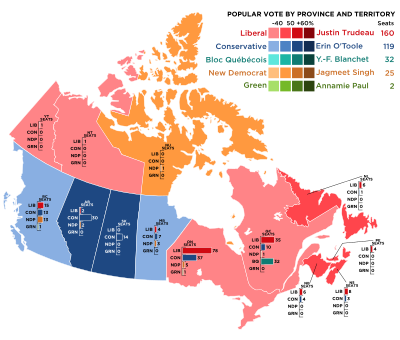| |||||||||||||||||||||||||||||||||||||||||||||||||||||||||||||||||||||||||||||||||||||||||||||||||||||||||||||
338 seats in the House of Commons 170 seats needed for a majority | |||||||||||||||||||||||||||||||||||||||||||||||||||||||||||||||||||||||||||||||||||||||||||||||||||||||||||||
|---|---|---|---|---|---|---|---|---|---|---|---|---|---|---|---|---|---|---|---|---|---|---|---|---|---|---|---|---|---|---|---|---|---|---|---|---|---|---|---|---|---|---|---|---|---|---|---|---|---|---|---|---|---|---|---|---|---|---|---|---|---|---|---|---|---|---|---|---|---|---|---|---|---|---|---|---|---|---|---|---|---|---|---|---|---|---|---|---|---|---|---|---|---|---|---|---|---|---|---|---|---|---|---|---|---|---|---|---|---|
| Opinion polls | |||||||||||||||||||||||||||||||||||||||||||||||||||||||||||||||||||||||||||||||||||||||||||||||||||||||||||||
| Turnout | 62.3%[1] ( | ||||||||||||||||||||||||||||||||||||||||||||||||||||||||||||||||||||||||||||||||||||||||||||||||||||||||||||
| |||||||||||||||||||||||||||||||||||||||||||||||||||||||||||||||||||||||||||||||||||||||||||||||||||||||||||||
| |||||||||||||||||||||||||||||||||||||||||||||||||||||||||||||||||||||||||||||||||||||||||||||||||||||||||||||
| Part of a series on the |
| 44th Canadian Parliament |
|---|
|
|
The 2021 Canadian federal election was held on September 20, 2021, to elect members of the House of Commons to the 44th Canadian Parliament. The writs of election were issued by Governor General Mary Simon on August 15, 2021, when Prime Minister Justin Trudeau requested the dissolution of parliament for a snap election.[2]
Trudeau won a third term as prime minister, his second minority government.[3] Though the Liberals were hoping to win a majority government to govern alone,[4] the results were mostly unchanged from the 2019 Canadian federal election.[5] The Liberals won the most seats at 160; as this fell short of the 170 seats needed for a majority in the House of Commons, they formed a minority government with support from other parties.[6][7] The Liberals set a record for the lowest vote share of a party that would go on to form government, winning 32.6 per cent of the popular vote, while losing the popular vote to the Conservatives as they did in 2019.[8]
The Conservatives led by Erin O'Toole won 119 seats, two fewer than their result in 2019, and continued as the Official Opposition. The Bloc Québécois led by Yves-François Blanchet won 32 seats, unchanged from the prior election. The New Democratic Party led by Jagmeet Singh won 25 seats, a net increase of one seat, but nonetheless fell short of expectations.[9] The Green Party maintained two seats but party leader Annamie Paul was defeated for the third[b] time in her riding of Toronto Centre. The party received 2.3 per cent of the popular vote, approximately a third of what they won in 2019.[10][11][12] The People's Party did not win any seats, despite winning nearly 5 per cent of the popular vote, and party leader Maxime Bernier was defeated for the second time[c] in his riding of Beauce.
Trudeau faced public blowback for holding an election in the middle of a global pandemic due to his expectation that doing so could translate his supposed rallying popularity into a landslide victory. Criticism worsened when Trudeau failed to win by a majority and instead repeated his 2019 election showing.[13] An official government probe later found that China attempted to meddle in the election to influence Canadian foreign policy.[14]
Following the election, Paul resigned as Green Party leader two months after the election,[15] and O'Toole was ousted as leader by his party's caucus in February 2022 over the poor showing in the election and other controversies ongoing at the time. In March 2022, the NDP formed a confidence and supply agreement with the Liberals.[16]
The election was the second one in a row where the Liberals succeeded in winning a plurality of seats despite having fewer votes than the Conservative Party.
- ^ "September 20, 2021 General Election – National Results". Elections Canada. Archived from the original on October 3, 2021. Retrieved October 4, 2021.
- ^ Cite error: The named reference
ctv081521was invoked but never defined (see the help page). - ^ Cecco, Leyland (September 21, 2021). "Canada election result: Trudeau wins third term after early vote gamble". The Guardian. Archived from the original on December 28, 2021. Retrieved September 27, 2021.
- ^ Austen, Ian (September 21, 2021). "4 Takeaways From the Canadian Election". The New York Times. ISSN 0362-4331. Archived from the original on December 14, 2021. Retrieved September 26, 2021.
- ^ Cite error: The named reference
NYT 2021was invoked but never defined (see the help page). - ^ Connolly, Amanda (September 20, 2021). "Liberals projected to form minority government". Global News. Archived from the original on December 29, 2021. Retrieved September 20, 2021.
- ^ Tasker, John Paul (September 20, 2021). "Canadians have re-elected a Liberal minority government". CBC. Archived from the original on January 20, 2022. Retrieved September 21, 2021.
- ^ Hopper, Tristan (September 22, 2021). "First Reading: The Least Popular Canadian Government Ever Elected". National Post.
- ^ Karadeglija, Anja (October 6, 2021). "NDP to review 'disappointing' campaign, help Liberals avoid another election: Singh". National Post. Retrieved October 7, 2021.
- ^ "Federal election 2021 live results". CBC. September 20, 2021. Archived from the original on December 29, 2021. Retrieved September 21, 2021.
- ^ Flanagan, Ryan (September 20, 2021). "Greens win first Ontario seat ever as national vote dries up". CTVNews. Archived from the original on October 30, 2021. Retrieved September 22, 2021.
- ^ Little, Simson (September 21, 2021). "Future of Canada's Greens in the spotlight after election setbacks". Global News. Archived from the original on December 16, 2021. Retrieved September 21, 2021.
- ^ Meler, Bryan (September 20, 2021). "'This election was an abuse of power': Canadians criticize, roast Liberal leader Justin Trudeau after repeat minority win in 2021 election". Yahoo. Retrieved April 9, 2024.
- ^ Ljunggren, David (April 8, 2024). "Canada spies found China interfered in last two elections, probe hears". Reuters. Retrieved April 9, 2024.
- ^ Ballingall, Alex (November 15, 2021). "Green Party formally accepts Annamie Paul's resignation as leader". Toronto Star. Archived from the original on November 15, 2021. Retrieved November 23, 2021.
- ^ Aiello, Rachel (March 22, 2022). "Liberals, NDP agree to confidence deal seeing Trudeau government maintain power until 2025". CTV News. Archived from the original on March 22, 2022. Retrieved March 23, 2022.
Cite error: There are <ref group=lower-alpha> tags or {{efn}} templates on this page, but the references will not show without a {{reflist|group=lower-alpha}} template or {{notelist}} template (see the help page).








